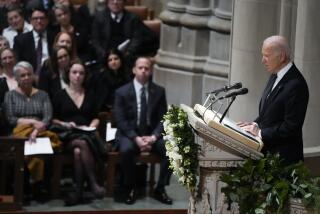The Miers mire
- Share via
THE WHITE HOUSE CAVED. In a stunning reversal for President Bush, and a blow to the cause of cronyism everywhere, his friend and lawyer Harriet E. Miers withdrew as a nominee to replace Sandra Day O’Connor on the U.S. Supreme Court. Both sides of the partisan divide in Washington rushed to spin the aborted nomination in equally cynical ways.
Democratic senators embraced the narrative of a nominee defeated by Republican extremists. Senate Minority Leader Harry Reid (D-Nev.) called the Miers withdrawal a victory for the “radical right wing.” This is silly. Yes, social conservatives were against Miers, despite Bush’s “trust me, I know her and she goes to church” assurances. But the broader point is that it’s a victory for the U.S. judiciary that someone with such dubious qualifications will not serve on its highest court.
More Democrats should have complained that Miers was unqualified. But they didn’t, apparently fearing an alternative nominee, and their silence speaks volumes about the timidity and intellectual cowardice of their party’s current leadership.
Even more absurd was the Republican rush to recast Miers as a martyr for the constitutional principle of separation of powers. True, the White House couldn’t exactly give the real reason for Miers’ withdrawal -- that, on her “listening tour” with senators, she couldn’t even fake an intelligent conversation about constitutional law. So her withdrawal was portrayed as a way to avoid a confrontation over the Senate’s right to obtain White House documents pertaining to Miers’ role as the president’s lawyer. But if Miers were someone truly qualified to serve on the court (instead of someone who hardly seems qualified to serve as the president’s lawyer), executive privilege would not have been an issue.
The day after Miers’ nomination was announced, we wrote that presidents should deviate from the norm of picking sitting judges for Supreme Court openings only in extraordinary circumstances -- for a leading legal scholar, say, or a thoughtful politician. Bush deviated from the norm to pick a buddy from Texas, a corporate lawyer and White House insider with a thin resume. The last few weeks made it painfully clear that her resume wasn’t lying.
Bush now faces a choice. He can either seek to placate the most extreme activists within his party by picking one of their favorites, or he can do what he did with his first Supreme Court pick -- nominate another mainstream conservative with such unimpeachable credentials that a wide spectrum of Americans will support him (or her; remember the name Maureen Mahoney).
Bush should take the latter route. It’s the political winner, but it would also result in a better court, which is what this whole drama is supposedly about.
More to Read
Get the L.A. Times Politics newsletter
Deeply reported insights into legislation, politics and policy from Sacramento, Washington and beyond. In your inbox twice per week.
You may occasionally receive promotional content from the Los Angeles Times.










